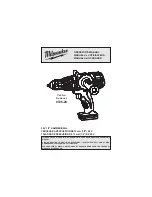
7
English
3. Maintenance of the motor
The motor unit winding is the very “heart” of the power
tool. Exercise due care to ensure the winding does not
become damaged and/or wet with oil or water.
4. Inspecting the carbon brushes (Fig. 14)
The motor employs carbon brushes which are
consumable parts. Since and excessively worn carbon
brush can result in motor trouble, replace the carbon
brush with new ones when it becomes worn to or near
the “wear limit”
ⓐ
. In addition, always keep carbon
brushes clean and ensure that they slide freely whithin
the brush holders.
NOTE
When replacing the carbon brush with a new one, be
sure to use the Hitachi Carbon Brush Code No. 999054.
5. Replacing carbon brushes
Take out the carbon brush by
fi
rst removing the brush
cap and then hooking the protrusion of the carbon brush
with a
fl
at head screw driver, etc.
When installing the carbon brush, choose the direction
so that the nail
ⓑ
of the carbon brush agrees with the
contact portion
ⓒ
outside the brush tube. Then push it in
with a
fi
nger. Lastly, install the brush cap.
CAUTION
Be absolutely sure to insert the nail of the carbon brush
into the contact portion outside the brush tube. (You can
insert whichever one of the two nails provided).
Caution must be exercised since any error in this
operation can result in the deformed nail of the carbon
brush and may cause motor trouble at an early stage.
6. Cleaning on the outside
When the driver drill is stained, wipe with a soft dry cloth
or a cloth moistened with soapy water. Do not use chloric
solvents, gasoline or paint thinner, for they melt plastics.
7. Storage
Store the driver drill in a place in which the temperature
is less than 40°C and out of reach of children.
NOTE
Make sure that the battery is fully charged when stored
for a long period (3 months or more). The battery with
smaller capacity may not be able to be charged when
used, if stored for a long period.
NOTE
Storing lithium-ion batteries.
Make sure the lithium-ion batteries have been fully
charged before storing them.
Prolonged storage of batteries with a low charge
may result in performance deterioration, signi
fi
cantly
reducing battery usage time or rendering the batteries
incapable of holding a charge.
However,
signi
fi
cantly reduced battery usage time may
be recovered by repeatedly charging and using the
batteries two to
fi
ve times.
If the battery usage time is extremely short despite
repeated charging and use, consider the batteries dead
and purchase new batteries.
CAUTION
In the operation and maintenance of power tools, the
safety regulations and standards prescribed in each
country must be observed.
Important notice on the batteries for the Hitachi
cordless power tools
Please always use one of our designated genuine
batteries. We cannot guarantee the safety and
performance of our cordless power tool when used with
batteries other than these designated by us, or when
the battery is disassembled and modi
fi
ed (such as
disassembly and replacement of cells or other internal
parts).
GUARANTEE
We guarantee Hitachi Power Tools in accordance with
statutory/country speci
fi
c regulation. This guarantee does
not cover defects or damage due to misuse, abuse, or
normal wear and tear. In case of complaint, please send
the Power Tool, undismantled, with the GUARANTEE
CERTIFICATE found at the end of this Handling instruction,
to a Hitachi Authorized Service Center.
Information concerning airborne noise and vibration
The measured values were determined according to
EN60745 and declared in accordance with ISO 4871.
Measured A-weighted sound power level:
83 dB (A) (DS14DSDL)
84 dB (A) (DS18DSDL)
92 dB (A) (DV14DSDL)
92 dB (A) (DV18DSDL)
Measured A-weighted sound pressure level:
72 dB (A) (DS14DSDL)
73 dB (A) (DS18DSDL)
81 dB (A) (DV14DSDL)
81 dB (A) (DV18DSDL)
Uncertainty K: 3 dB (A).
Wear hearing protection.
Vibration total values (triax vector sum) determined
according to EN60745.
Impact drilling into concrete:
Vibration emission value ah, ID =
11.9 m/s
2
(DV14DSDL)
12.3 m/s
2
(DV18DSDL)
Uncertainty K = 1.5 m/s
2
Drilling into metal:
Vibration emission value ah, D < 2.5 m/s
2
Uncertainty K = 1.5 m/s
2
The declared vibration total value has been measured in
accordance with a standard test method and may be used
for comparing one tool with another.
It may also be used in a preliminary assessment of exposure.
WARNING
○
The vibration emission during actual use of the power
tool can di
ff
er from the declared total value depending in
the ways in which the tool is used.
○
Identify safety measures to protect the operator that
are based on an estimation of exposure in the actual
conditions of use (taking account of all parts of the
operating cycle such as the times when the tool is
switched o
ff
and when it is running idle in addition to the
trigger time).
NOTE
Due to HITACHI’s continuing program of research and
development, the speci
fi
cations herein are subject to
change without prior notice.
0000Book̲DS14DSDL.indb 7
0000Book̲DS14DSDL.indb 7
2014/10/09 16:34:58
2014/10/09 16:34:58








































